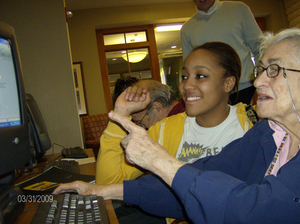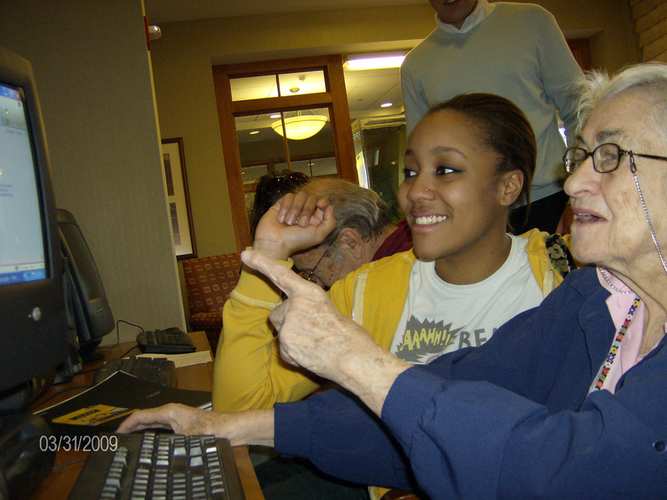Tutors Teach Seniors New High-Tech Tricks

At Pace University in New York, college students who tutor seniors in local retirement homes are prepped with sensitivity training. Brittany Beckett (left), a Pace student, and Muriel Cohen work together at United Hebrew of New Rochelle.

At Pace University in New York, college students who tutor seniors in local retirement homes are prepped with sensitivity training. Brittany Beckett (left), a Pace student, and Muriel Cohen work together at United Hebrew of New Rochelle.
A week after Christmas, many Americans are no doubt trying to figure out how to use the high-tech gadgets they got as gifts. This can be especially challenging for seniors. But a number of programs across the country are finding just the right experts to help usher older adults into the digital age.
For Pamela Norr, of Bend, Ore., the light bulb went off as she, yet again, was trying to help her own elder parents with a tech problem. To whom did she turn?
"My teenage kids," she says.
Norr happens to head the Central Oregon Council on Aging, and thus was born TECH — Teenager Elder Computer Help.
"I thought if my parents need it, probably other seniors need it, too," she says.
High school students studying computer tech or involved with the National Honor Society sign up to teach local senior citizens about Facebook, Skype, smartphones, even something as seemingly simple as a camera. Norr discovered that many seniors had been given digital cameras by their children.
"They were going around town taking all these great pictures that they wanted to send to their family members," she says. But they "couldn't figure out how to connect to the USB port or take out the SIM card."
Many elders have moved to central Oregon to retire. Sigrid Scully, 84, signed up for a TECH class because she was struggling to stay connected with far-flung family.
"My kids were not returning calls," she says. "They don't write letters. They are so knowledgeable about texting and email, and so I needed to get to know how to do that."
My kids were not returning [telephone] calls. They don't write letters.
Scully worried she'd never catch on. She'd read a computer manual once, but didn't understand words like "icon" or "cookies." She says her teen tutor was personable and used plain language.
"So many teenagers think that seniors are just old people that don't know anything," she says. "And actually, the camaraderie and knowledge that we can transmit to one another is so wonderful and so helpful. I had that feeling with this class."
Sensitivity Training
"It has made me think about what life was like without Facebook and the Internet," says 15-year-old Tucker Rampton, who's helped train about a dozen Oregon seniors. He's been surprised to have to explain email, something he thought everyone had mastered. Then again, a lot of seniors ask him about Twitter, which Rampton admits he knows nothing about. He says teaching tech to seniors has changed his perspective.
"I think it's a very good idea to work on your patience," he says, "and be more understanding when it comes to what's going on in their minds."
At Pace University in New York, college students who tutor seniors in local retirement homes are prepped with sensitivity training.
"They get to feel what it's like to be 70, 80, 90 years old," says associate professor Jean Coppola, who directs the program. "They wear specially prepared glasses that give them different visual impairments."
Coppola also has students do things like tape two fingers together — to simulate the effects of arthritis or a stroke — then try to navigate a mouse. By the time they're at the computer with an elder, she says, they're not frustrated at all.
"They'll say something a hundred times because they've worn cotton balls or earplugs in their ear," she says. "They understand that they have to speak up, articulate their words."
Coppola says the whole thing is a bonding experience for both generations. Applause often breaks out the first time a senior receives an email. Some have been able to see new grandchildren for the first time through emailed photos.
Pamela Norr, in Oregon, says young trainers also gain new confidence. They see that the seniors are "not criticizing me for the way I dress," she says, "or clucking their tongue. They're actually respecting me for the knowledge base that I have."
Perhaps most unexpected, some teen trainers and seniors have even become friends. They keep in touch long after class ends — through Facebook, of course.
More From This Series

All Tech Considered
To Get Out The Vote, Evangelicals Try Data Mining
One company is combing through personal data to identify and register conservative Christian voters.

All Tech Considered
Where Eye Care Is A Luxury, Technology Offers Access
Smartphone eye exams and liquid lenses could help make eye care less expensive.

All Tech Considered
Tutors Teach Seniors New High-Tech Tricks
Across the country, teens and college students are helping usher older adults into the digital age.
Comments
Discussions for this story are now closed. Please see the Community FAQ for more information.




John Stevens (44sux) wrote:
This comment has been removed because it did not meet the NPR.org Community Discussion Rules.
Tuesday, January 03, 2012 4:16:28 PM
Recommend (0)
Report abuse
Jill Moore (jillfromni) wrote:
My 86 years old dad s in the UK; he bought a Mac two years ago and we started to correspond daily. In March I convinced him to buy an iPad so that he could talk to his grandchildren at universities in the USA and UK and keep up to date and in contact with us in the US. We face time daily and are able to keep in contact at all times. I'm impressed that a platform works for 86 year olds and for 4 year olds in the school where I teach at the same time. In between I collaborate with my students and pass the information on to my peers. I love it all and enjoy that learning is truly lifelong.
Monday, January 02, 2012 9:16:11 PM
Recommend (4)
Report abuse
Karwani Nyakairu (mutoro) wrote:
What a wonderful way to connect the young and the old!!!!
Monday, January 02, 2012 6:46:11 PM
Recommend (3)
Report abuse
Cher Cox (Cowbelle) wrote:
Good luck with my Mom. She'll only listen to boys. Seriously.
Monday, January 02, 2012 4:42:08 PM
Recommend (6)
Report abuse